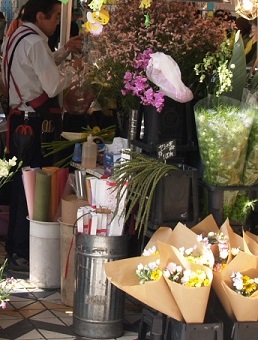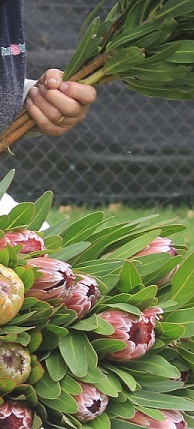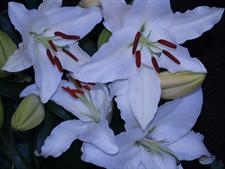Expand Your Business & Career Opportunities in the Cut Flower Industry

Cut flower production is an expanding industry worldwide. It has a great deal of export potential, and although most flower producing countries meet the domestic requirements of their cut flower markets, the home market potential in many countries could be further developed. Spending on cut flowers is stronger in some countries than others, the average Australian for example spends far less on cut flowers than say, the average German or Frenchman).
Germany imports most of their cut flower requirements (up to 70%) with The Netherlands being the largest exporter to Germany. Japan and the United States have the largest cut flower market almost doubling that of Germany.
During the later part of the 20th century, cut flower production developed rapidly.
Colombia, Israel and to a lesser degree, Australia, developed export cut flower industries rapidly during this period with China and India having the largest areas under cultivation (but low yields per hectare).
The Netherlands has been, and continues to be a major export market that also has a large domestic demand, the local demand almost equaling exports. Countries such as India and China although having large production areas are still in the developing stage mainly due to the low quality of exports and the financial constraints limiting imports. Colombia and Kenya export most of the cut flowers produced with only a small local market.
Modules
Note that each module in the CERTIFICATE IN HORTICULTURE (CUT FLOWERS) VHT002 is a short course in its own right, and may be studied separately.
Scope of the Cut Flower Industry
 Cut flowers and/or foliage can be a very profitable mainstream crop; or equally valuable "sideline" cash crop. If you are to make a profit from cut flowers or foliage, the critical considerations are what to grow, producing quality blooms, and how to market your produce.
Cut flowers and/or foliage can be a very profitable mainstream crop; or equally valuable "sideline" cash crop. If you are to make a profit from cut flowers or foliage, the critical considerations are what to grow, producing quality blooms, and how to market your produce.
Many common cut flowers (eg. bulbs, perennials and annuals) are quick cash crops, which require a great deal of attention, but can produce a return within 2-6 months of planting. Plants in this category, such as gladioli, carnations or chrysanthemums, might be grown in paddocks, or some (e.g. carnations) grown as a hydroponic crop.
Other cut flowers and foliage plants are woody, and can take several years before they are producing good crops (eg. Thryptomene, Proteas, Banksias, Dryandras, Roses, or Geraldton Wax). While many cut flower farms devote paddocks solely to such woody crops; there is also potential for them to be integrated with other enterprises, for example, when the principle crop is not in production (e.g. dormant bulbs) a farmer could also utilise the land by grazing cattle or other grazing animals to make use of any pasture species present.
Consider:
Mainstream cut flower production can require long hours (often more hours than many other horticultural crops), and need precise cultural procedures. Competition is strong both domestically and internationally with the priority on top quality blooms having uniformity and being free from blemishes. New colours and varieties in many cases can offer an advantage over other growers.
Farmers interested in further investigating this area for potential diversification, can contact a variety of associations and organisations (e.g. agricultural departments, cut flower growers groups) for more detailed information (see the directory at the rear of this book).
Some of the popular flower or foliage crops grown include:
Working Today

The scope and nature of work in the world is constantly changing. Getting a job used to be relatively straight forward. Before the mid-20th century the world was much simpler. Pathways to careers were also much simpler. Many people would follow in the footsteps of their parents, doing similar training, and following on to do similar work. Those who moved away from the “family business”, may have aspired to something different; perhaps to become a doctor, teacher or engineer. In almost all of these careers, there was a relatively well established path to follow. It might have involved going to university, then gaining employment as an intern, learning on the job and over the decades advancing your career.
Unlike days gone by – where a career may have been a process of following in your parents’ footsteps - today’s path to a career is much more focused on what you can do for yourself to enhance your opportunities.
It is a known fact that even today, many jobs are filled through ‘word of mouth’ i.e. someone knows of someone that would fit the job, rather than through advertising. This is usually achieved through ‘networking’. Networking involves hard work! You need to be ‘seen’ to be doing useful things for others. You need to be considered capable, reliable and friendly in order to build a network of contacts that respect you, and are willing to put your name forward to potential employers.
Employers look for people that are knowledgeable, able and positive. However they also look for potential, so although your knowledge and skills may still be still evolving, if you have the right attitude: a positive approach, a confident manner, the ability to transfer the skills you already have to their business, and the willingness to learn and grow - you will be looked upon very favourably.
How Will You Benefit from this Course?
- Fast track business or employment opportunities with flower production
- Develop broad based horticultural skills that allow you to work in any sector of gardening or horticulture
- Experience a unique training developed by a large international team of horticulture professionals
- Save time -don't waste time and money traveling to classes
- Take control of when and where you study, and your speed of learning
- Access an exceptional team of professional horticulture tutors from across both Australia and the UK, to gain a very broad and internationally relevant learning experience
- Learn to understand flower production more deeply, to make better decisions, and achieve greater results
- Build networking with industry to become more aware of business and career opportunities
- As a graduate, receive free career and business advice from our horticultural staff -yours for the asking.
Employment Prospects
- Cut Flower Farms, small and large
- Flower Marketing
- Plant propagation and breeding
- Seed and bulb production
- Flower retailing
- Garden tourism
Other Study Options
ACS courses are created as 100 hour building blocks of study. There are over 500 of these "modules" to choose from. In the field of horticulture we offer more choice and flexibility than you are likely to find anywhere.
ENROL or Use our FREE Course Advice Service to Connect with a Tutor